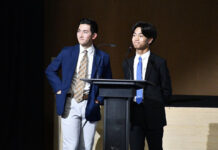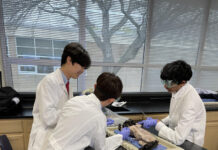Whenever you sneeze or cough intensely, you could be very sick, or you could be having an allergic reaction. When this happens, you would probably go to the doctor to get it checked out, because it is very important to figure out which of the two it is so you can be treated properly.
But who is entrusted with such a task? Well, these people are known as allergists. Allergists are physicians who are trained to diagnose symptoms of allergies, and then administer treatment for them. It is vital for these doctors to give the patient proper treatment, because, for some allergy-prone individuals, their allergic reactions can be life-threatening. The job is certainly a huge responsibility.
This April 20, Dr. Schroeder, an allergist at Park Cities Allergy and Asthma, came to Jesuit to explain these complexities.
Once a month at Jesuit, a professional from a field of medical science comes to the school to speak to the medical society. Along with this, members of the medical society also participate in a variety of other activities including day trips to UT Southwestern Medical School and monthly meetings with the Southwestern Explorers Club. Students are given these opportunities to educate and expose themselves to various aspects of medical science to prepare for possible career paths in the medicinal field.
One side of these experiences allows them to engage in and get a personal feel for what working in this area might entail, and the other gives them a thorough education and understanding of specific topics. Jesuit students and teachers alike attended the lecture given by Dr. Schroeder about allergies and got a detailed look into life of an allergist.
When asked about his thoughts on the lecture, Matthew Brewer ’17 stated, “Dr. Schroeder shared various aspects of her specialty, informing us on how the body’s allergic reaction works, explaining inflammation, and providing information on general food allergies. She explained different treatment solutions for allergies, detailing her role in diagnosis and how treatments have evolved over the years. Her experience was especially evident when answering all of our questions thoroughly. She was able to explain some very complicated biological processes in common language we were all able to understand. She set a great example of a successful doctor, sharing her love of medicine and biology with others.”
Giving a teacher’s perspective on the presentation, Ms. Boyle remarked, “Dr. Schroeder was very hands-on in that she brought 3D models of various areas affected by allergies as well as illustrated books to explain the science behind her medical discipline.”
It’s one thing to simply explain her medical field to the students, but Dr. Schroeder fully immersed the audience into her presentation, allowing them to visualize the processes going on with allergies. It seems that not only the students but also the teachers were impressed by Dr. Schroeder’s creative lecture.
Overall, the students learned more about allergists, and many of them found it very interesting. The teachers were also fascinated with Dr. Schroeder’s informative presentation, and happy that they could give these kids a closer look into medical science. Be sure to stay tuned to The Roundup for more coverage of the Jesuit medical society!






